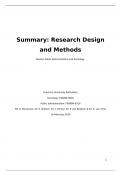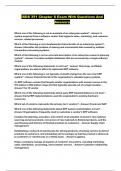Resume
Summary Research Design and Methods (2024), contains elaboration of the lectures, literature, web lectures and notes from the lectures
- Cours
- Établissement
- Book
Summary of module 1, module 2-B and module 3-A. The summary contains all quantitative modules of the course Research Design and Methods (FSWBM-9010/ FSWSM-9020). The summary includes lecture outlines, literature, online lectures and notes from the lectures. In addition, the required chapters from t...
[Montrer plus]





